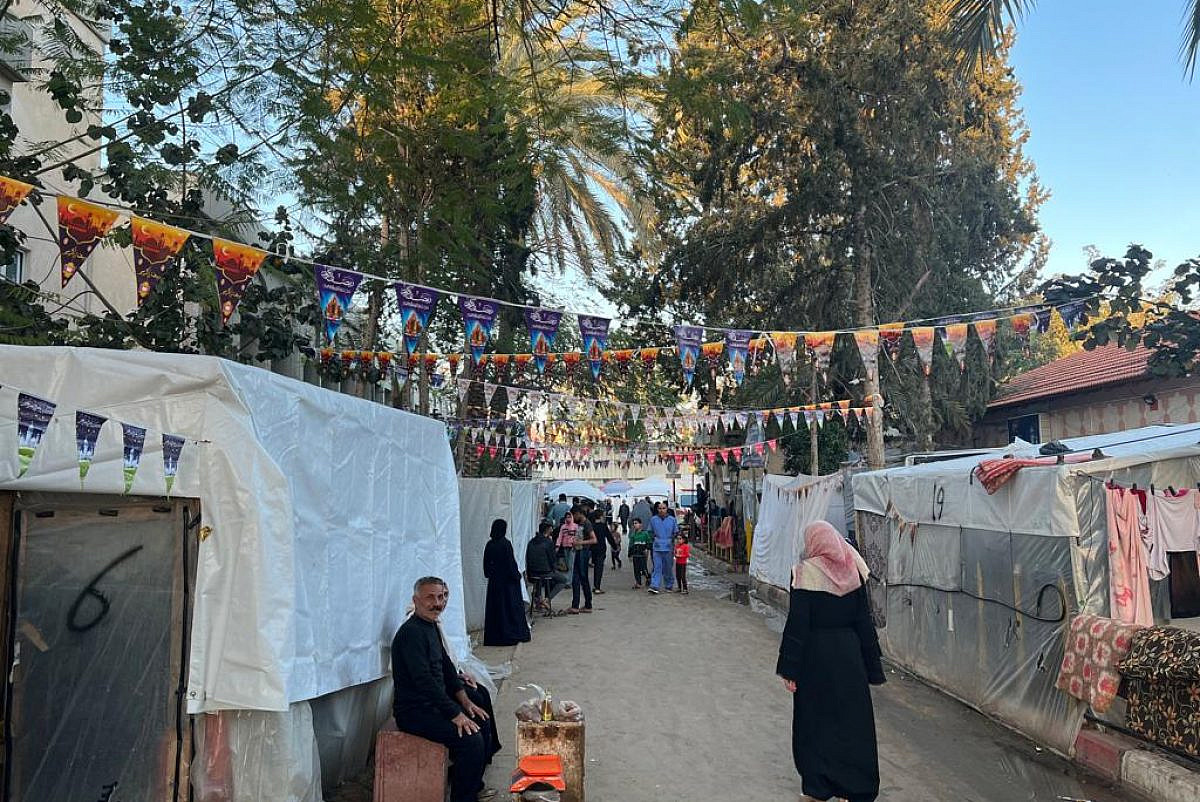The European Hospital near Khan Younis is overflowing with thousands of Palestinians displaced and wounded by Israel’s war on the Gaza Strip, which is now approaching its seventh month. Both the hospital’s corridors and its courtyard outside are filled with tents, the people’s suffering apparent for all to see. There are no verified figures on the exact number of people here — the hospital estimates about 30,000 people are crowded in the premises — but the families are clearly facing immense difficulties in obtaining the most basic needs, with the hospital ill-equipped to serve as a massive makeshift shelter.
But despite the horrors of the war, the Palestinians here are trying their best to mark the holy month of Ramadan, with Eid al-Fitr approaching in two weeks’ time. Families and hospital staff have put up some decorations and distributed them to children to adorn the tents and corridors, hoping to create a festive atmosphere amid their horrid conditions.
“Despite the wounds, martyrs, war, and destruction on our children, women, and elderly, we are still steadfast and trying to celebrate the advent of the fasting month,” said Jamal Al-Masry, 55, who had to flee his home in Al-Shati refugee camp and seek shelter at the European Hospital.
Hala Ghaben, 53, who was displaced from the Sheikh Radwan neighborhood of Gaza City, said that her son had initially set out for the city of Rafah to try and sell Ramadan decorations in order to get some money to buy food for the family. However, “when he saw the children [look at the decorations], he decided not to sell them, but to give them to the kids for free and make them happy.”
The effort to bring some sense of festivity has been extremely difficult. Many adults in the hospital expressed feeling deeply despondent of experiencing Ramadan far from their homes, many of which are now destroyed, while being separated from many members of their families, some of whom have been killed or badly injured during the war. The absence of food and clean water, with months of widespread malnutrition and starvation, has made this fasting season even more challenging to endure.
Yet many children here, while missing their homes and former lives, have been glad not to be deprived of some joyful scenes. And everyone here, young and old, is holding out hope that this month will finally bring about salvation from the terrible war.
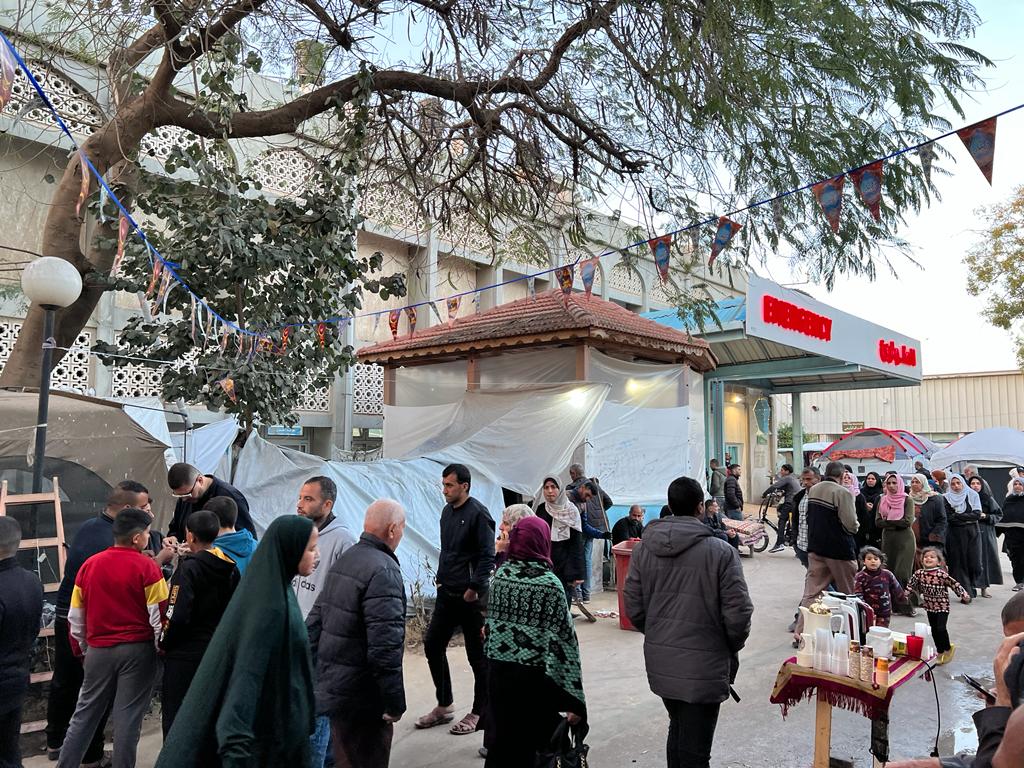
‘I lost my dreams, my home, my childhood’
“The month of Ramadan was the most beautiful time of the year,” lamented Ghaben. “Family gatherings, tables full of food and decorated for iftar. We’d go to the mall to shop, or order delicious meals from restaurants and take them to the seaside to break our fast there.”
Now, however, many of Ghaben’s family members have been scattered by the war, barely knowing each other’s whereabouts. “The displaced people around us are in a state of great sadness and tragedy. We miss gathering with neighbors and friends for tarawih prayers [an evening prayer during Ramadan]. I lost my kitchen, in which I used to spend more than four hours preparing the most delicious food. Now I am in a tent and sitting on the sand. I do not have enough kitchen utensils. There is only canned food, because the prices have become so expensive.”
When the war began, Ghaben was in Egypt for medical treatment for her back. Communication with her children and grandchildren in Gaza City were constantly disrupted, until they eventually fled southward to Khan Younis, where Ghaben met them after re-entering Gaza during the week-long truce at the end of November. They found no place to shelter except for the European Hospital, where they have set up tents in the hospital garden.
“I was shocked by the situation here,” she said. “There is no water, no food, nothing. I cannot use the bathroom because of the long lines of people waiting. We cannot relieve ourselves like normal people. We are deprived of everything. Unfortunately, many of the displaced people here urinate on themselves because there are not enough bathrooms in the hospital.”
Most of the tents in the hospital are narrow, she pointed out, “not enough for 10 people to sleep in. I sit all day at the entrance of the tent, staring at people’s faces. Sometimes people pass by carrying martyrs. We lost our ability to cry because our hearts have exploded from the pain. We do not feel safe. Every day we hear bombing and shells from Israeli tanks. Many missiles are dropped near the hospital, spurting sand out of the ground like a volcano.”
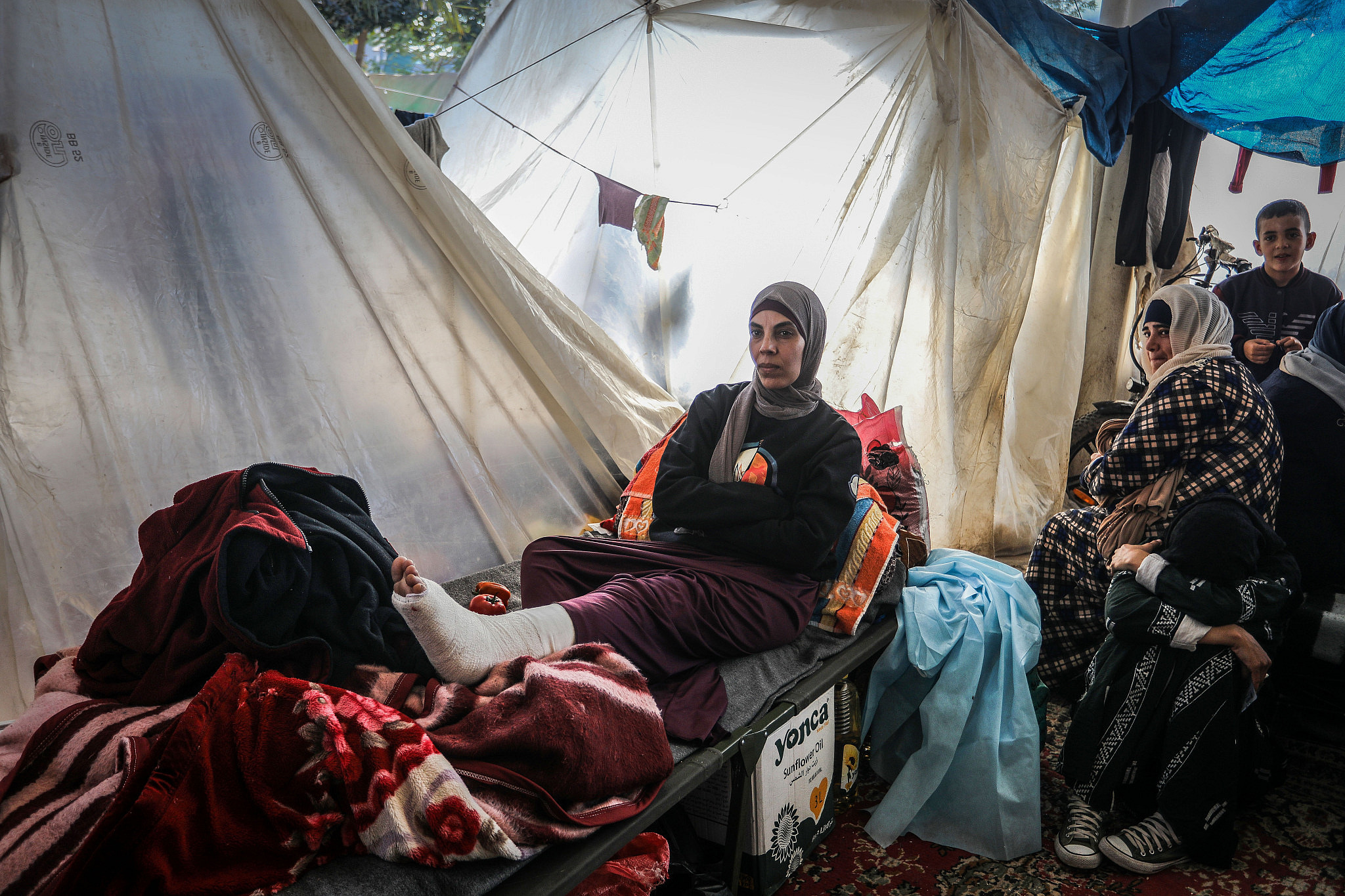
As a result, Ghaben said sorrowfully, “What we are experiencing are the worst moments of our lives on what used to be the most beautiful days of the year … I had hopes of returning to my home in Sheikh Radwan. Every day I wait for news of successful ceasefire negotiations, because life in a tent is impossible.”
Khalil Abu Hasaneen, Ghaben’s 13-year-old grandson, is overwhelmed by the agony of the war. “I lost everything in this war — my dreams, my home, my childhood,” he said. “I spend my time searching for water and waiting for food, watching the injured and the martyred. We left our home because of the intense bombing, and we moved to my grandparents’ place, and then to Al-Shifa Hospital in Gaza City. But when we saw the Israeli army leaflets ordering everyone to move south, we fled to the European Hospital.
“I live a life of humiliation, oppression, and persecution in this hospital,” Khalil continued. “Before the war, we ate chicken and drank fresh water. I loved studying and making many friends. But this war made me eat canned food and drink salty water, and [it] killed my friends and loved ones. We want to return to Gaza City. I miss my home and life there.”
When I asked him about celebrating the holy month, Khalil said: “There is no Ramadan atmosphere. Life in the hospital is non-existent. But I have to bear the hardships. I have no choice. We were accustomed to different family rituals in our homes; I miss the decorations and lanterns. Gaza during Ramadan was beautiful, but the war destroyed everything.”
Even as he tries to hold out some positive spirit for Ramadan, Al-Masry, from Al-Shati, cannot escape the sadness and fear that has consumed people in Gaza. “As a father and grandfather, I cannot provide my family with the simplest needs of life, such as food and water,” he said. “There is no place to relieve yourself in the hospital. The overcrowding is frustrating. Everyone’s faces are sad, with no hope for life as the war continues. The hospital cannot be a shelter for thousands — it can hardly provide medical services to the sick and wounded.”
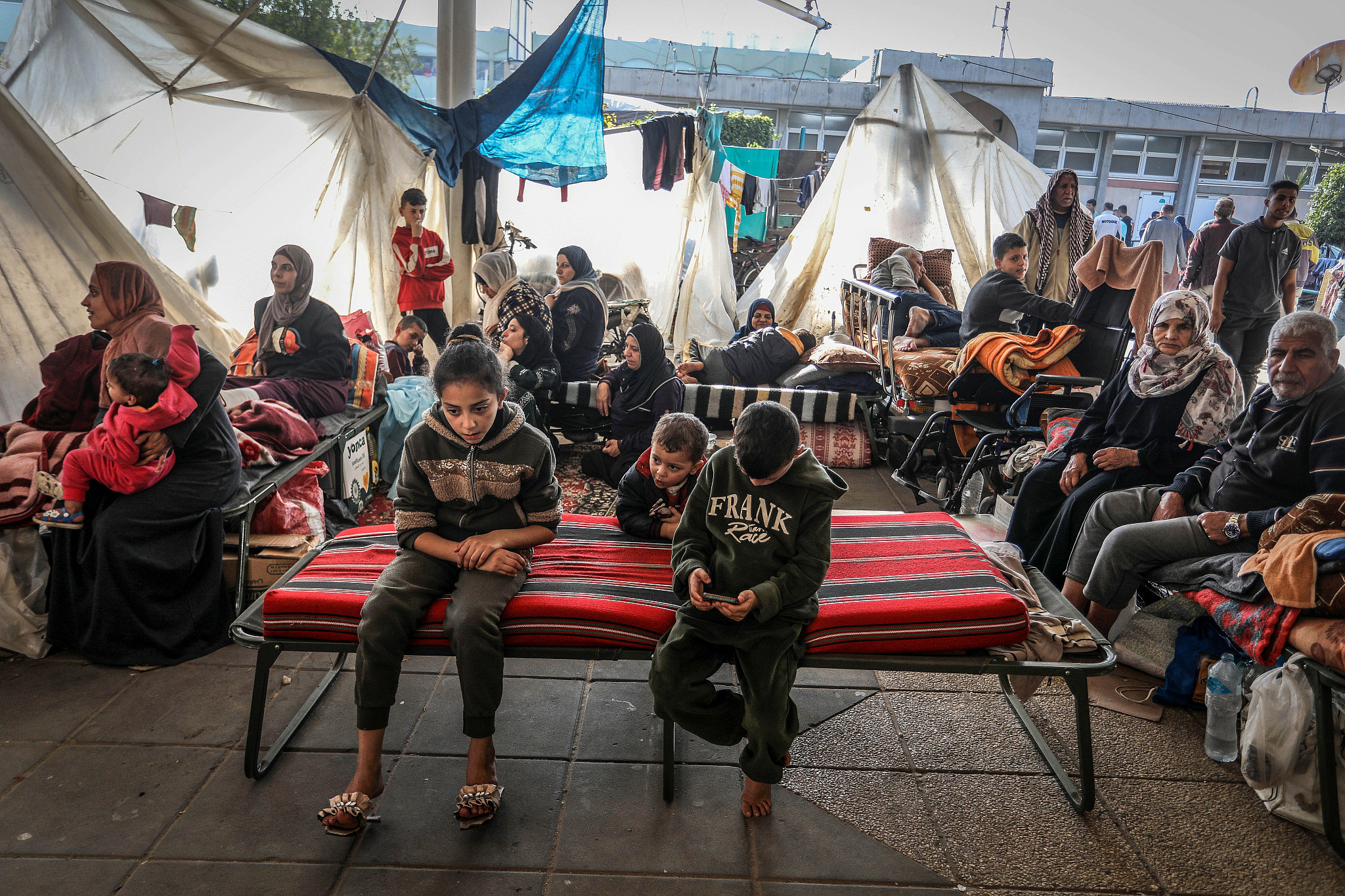
Al-Masry fondly remembers the Ramadan rituals enjoyed before the war, including suhoor (breakfast before the fast begins at dawn), shopping for food and clothes in the local markets, and spending hours searching for sweets and drinks. But in the hospital, it takes a lot of effort to feel that it is Ramadan. “We must get used to these conditions, even though they are very difficult. But we are a people who love life and wish for happiness and security. Perhaps it will be a good month that will bring an end to this war.”
‘I can’t leave my job — it’s a great responsibility’
Meanwhile, the European Hospital has been struggling to carry out its most basic operations, let alone provide for the thousands of people now sheltering in its facilities. This has gotten even more difficult given that most of Gaza’s hospitals, including the nearby Nasser Medical Hospital, have been forced to close due to the heavy Israeli bombardments, ground raids, and ongoing siege that has depleted vital resources, from medical supplies to electricity.
“We are working day and night to treat patients,” said Dr. Omar Khattab, a 37-year-old pediatric surgeon from Khan Younis. “The overcrowding here negatively affects the quality and speed of our work. We cannot move quickly through the corridors due to the people and the tents. When patients are treated and need to be discharged, they refuse to leave because their homes or neighborhoods are either demolished or still dangerous, and so they stay with their families at the hospital. It’s their only place of shelter.”
The strains of the war have taken their toll on Khattab personally. “Because I work long hours and was very worried about my wife and three children, I asked them to take refuge in the hospital, so now we all sleep in the doctors’ room. I can’t leave my job — I feel that it is a great responsibility.
“Many of the wounded children here have multiple health problems,” he continued. “There are children who suffer from malnutrition and pollution. We are working with the simplest equipment despite the desperate need for further treatment and follow-ups, but the hospital cannot help with that. The hospital area is also not safe, because we hear the sounds of tank shells from time to time, in addition to the missiles that target the area.”
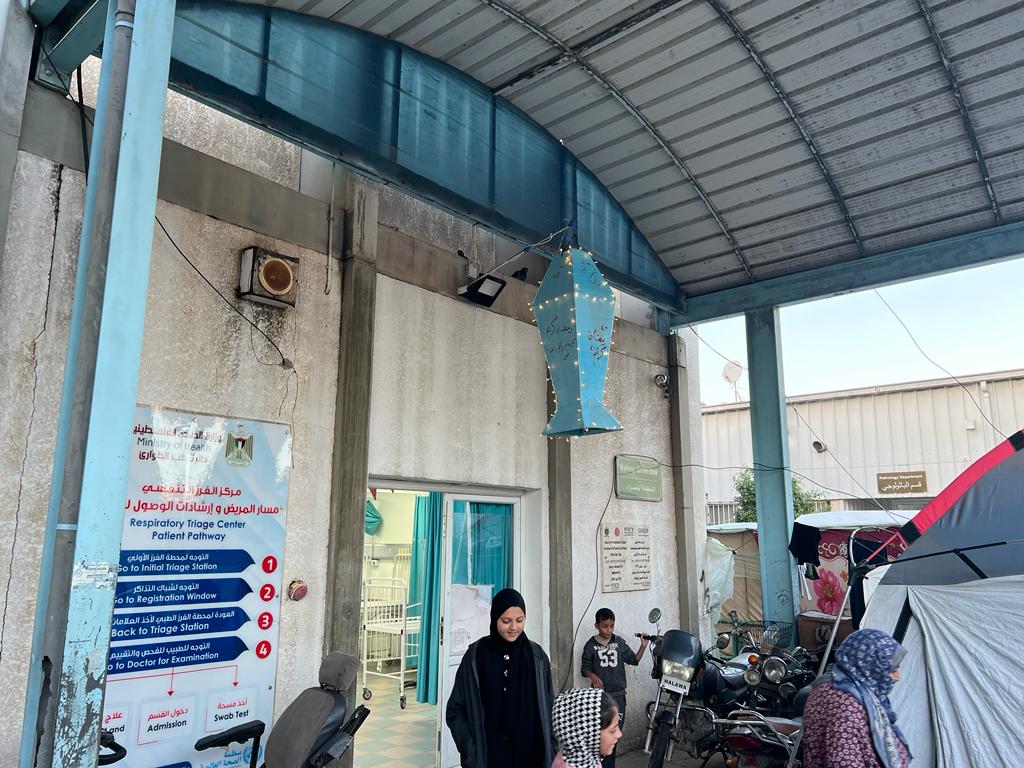
As for Ramadan, he said, “It is painful to spend this month away from our families. I am accustomed to having iftar with my father and mother. Unfortunately, they were displaced to a tent in Rafah, and I cannot leave my work to be with them.”
The director of the European Hospital, Yousef Al-Akkad, similarly noted the unbearable pressures on the hospital as the last, large functioning health facility in the area. The overload of patients has forced the staff to place them in hospital wings that are not set up to meet their urgent medical needs, with some patients having no choice but to lay on the floor because of the lack of beds. “We have a shortage of medical supplies and medications, such as anesthesia, antibiotics, pain inhibitors, and dialysis medications,” he added. “What we provide is the minimum healthcare.”
On top of all this, Al-Akkad noted that the acute shortage of food, clean water, and electricity to provide for the displaced masses as well as the patients. Without any homes, he said, the displaced “consider the hospital safer, even though there is no safe place in Gaza.”
The European Hospital’s staff, meanwhile, are extremely burned out. “We are in the sixth month of the war. The health teams, doctors, nurses, and all workers are so tired that it is impossible to continue the service as required,” Al-Akkad explained. “They have a lot of duties toward their families. Some of them are displaced inside the hospital, and others are living in tents in Al-Mawasi [a nearby coastal plain now serving as a mass encampment], and they need to check on their families. This makes them physically and psychologically exhausted, and they need all our support.”
Most read on +972
Given all this, Al-Akkad warned, the hospital “may totally collapse soon. Hundreds of wounded people have finished their treatment period and have been asked to leave the hospital, but they have nowhere to go. Many can’t stay in tents due to their medical conditions. Some patients are from the northern parts of the Gaza Strip, and cannot return due to the presence of Israeli army checkpoints that do not allow them to pass through.”
All the while, Al-Akkad added, the hospital remains under the constant threat of Israeli incursions or besiegement, as experienced by other hospitals throughout Gaza, which may force it to shut down and turn away the wounded, sick, and displaced. “But we hope that does not happen,” he prayed.

